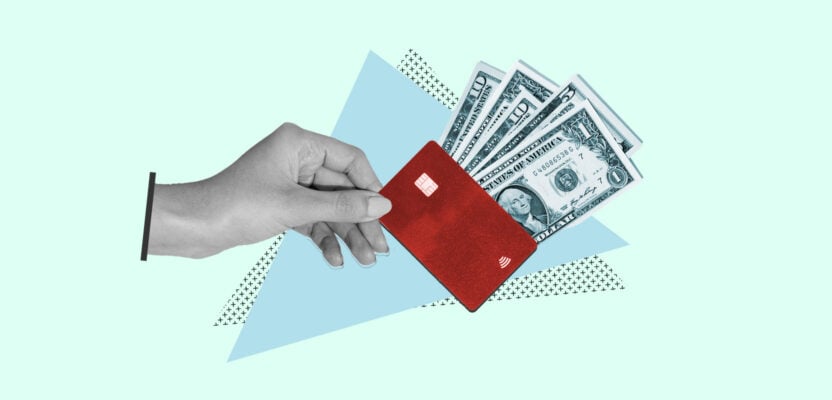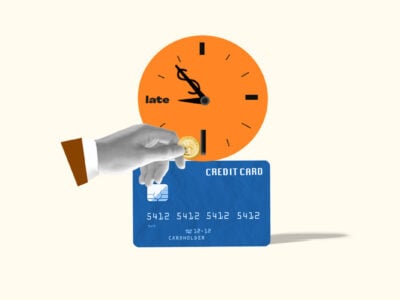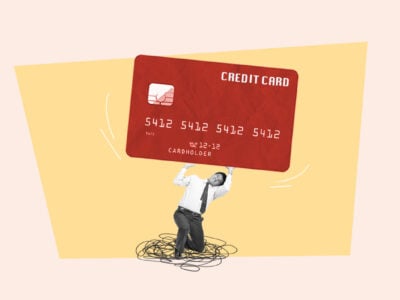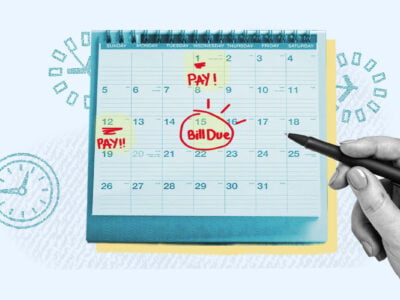You may have heard the rumor that carrying a balance on your credit card can improve your credit score. This isn’t necessarily true. Paying your credit card in full every month is the best way to maintain a good credit score. Read on to find out why paying in full is better than carrying a balance, how often you should pay your credit card bill, and how much of it you should pay at a time.
Table of Contents
Is it better to pay off my credit card in full or keep a balance?
It’s a popular credit myth that leaving a small balance on your credit card will boost your credit score. However, leaving a balance on your card will likely do more harm than good.
Experts strongly recommend paying off your credit cards in full each month for two reasons:
- You’ll avoid paying interest on debts owed: Leaving any balance (even a small balance) unpaid by your credit card’s due date will incur interest. Credit card interest is compounded daily, meaning every day you leave a balance on your card, you’re racking up more and more debt. 1
- You’ll have a better credit utilization rate: Your credit utilization rate, which is the percentage of available credit that you’re using, is a major factor in your credit score. A lower utilization rate contributes to a higher credit score. As utilization is calculated by dividing your balance by your available credit, the lower your balance is, the lower your utilization rate will be.
Most experts recommend that you pay off your credit cards in full every month. However, some people believe that leaving a small balance on one credit card, known as the AZEO method, will help your credit score even more. We’ll explore what the AZEO method is and why we don’t recommend you use it.
What is the AZEO method?
The AZEO (which stands for All Zero Except One) method is the practice of maintaining a $0 balance on all of your credit cards except for one. The idea behind this method is to try to get your credit utilization rate incredibly low without hitting 0% in order to maximize your credit score.
While having a 0% utilization rate is better than having a high ratio, it theoretically isn’t as good as maintaining a ratio in single digits. This is because creditors want to know that you’re capable of using your credit in a responsible, controlled way, rather than not using it at all.
All of this is likely overcomplicated. Major credit scores like FICO and VantageScore simply recommend you keep your credit utilization rate below 30%.
Why should I pay my credit card in full?
There’s no proof that using the AZEO method is more effective than simply keeping your credit cards at a low utilization rate by borrowing responsibly and paying your credit card bill at the right time.
Ultimately, trying to manipulate your credit utilization rate by leaving a balance on one or more credit cards is a risky endeavor. Not only do you risk actually raising your utilization rate, but you also risk:
- Accruing interest
- Incurring late fees
- Harming your payment history
- Losing your grace period
Not paying your credit card can do more harm than good, especially when it benefits you to pay. As your payment history counts toward 35% of your credit score, paying your balance in full and on time is ultimately the best way to achieve a high credit score. 2
How often should I pay my credit card bill?
How often you can pay your credit card will depend on how many purchases you make each month and what your financial situation is. However, you should aim to pay your credit card bill in full over a few payments throughout the month.
By paying your balance in full but over time, you’ll avoid accruing interest, limit your risk of large end-of-month withdrawals, and boost your credit score. 4 Furthermore, paying early can help your credit score.
Should I pay off my credit card all at once?
Although you should pay your credit card in full each month, paying in one lump sum may not be ideal.
We recommend that you avoid waiting until your credit card’s due date to pay your full bill for the following reasons:
- You risk missing the due date and accruing interest.
- You risk accidentally overspending for the month, making paying the full amount difficult or impossible.
- You risk having a high credit utilization rate when your card issuer reports your account to the credit bureaus. For example, if you use $800 out of the $1,000 limit on your credit card, it’ll be reported as an 80% utilization rate. By paying early, you can keep that rate below the recommended 30%. 5
- Credit card due dates often coincides with other monthly expenses like rent and utility bills. Waiting to pay your full bill at the end of the month means you might be taking out a large chunk of money in a short period of time.
Making smaller payments over the course of the month will help you manage your finances and ensure your credit card is paid in full by the due date.
Should I pay off my credit card after every purchase?
While you want to make sure to pay your credit card in full every month, paying it off immediately after you make a purchase might not be the best move.
Most purchases take a few days (usually one to three) to register on your credit card statement. Until then, you’ll notice purchases labeled “pending” on your account. Paying off a purchase while it’s pending means that payment won’t be registered to your credit card statement, and therefore won’t affect your credit score.
Using and paying off your credit card on time raises your credit score, but payments that don’t register on your statement won’t affect your score at all—positively or negatively. However, if no purchases are registered on your statement, it may look like you aren’t using your card at all, which could lead to card cancellation.
If you have the funds and want to resolve your debt quickly, aim to pay off purchases a few days after the transaction. If you use online banking, check to ensure that purchases are no longer marked “pending” before paying off the balance.
What else can I do to boost my credit score?
Paying off your credit card in full every month is the most important part of achieving and maintaining good credit. But if you really want to reach for that perfect 850 and improve your credit score even further, follow these tips:
- Consolidate your debts: If your credit score isn’t as high as you’d like it to be, there’s a good chance unresolved debt is the main culprit. A great way to tackle your outstanding balance is to consolidate debt. By consolidating your debt, you’re making payments easier to manage and lowering your interest rate.
- Avoid canceling cards: Once you’ve paid off your credit card in full you may be tempted to cancel the card to avoid annual fees or overspending. But canceling a line of credit will raise your credit utilization ratio by lowering your overall available credit. Unless your card is costing you a lot in fees, try to stash it away for emergency use only instead of canceling altogether.
- Increase your credit limit: Keeping your credit utilization low is a critical part of getting a good credit score. To lower your ratio, you can use less credit or have a higher credit limit (ideally, both). Simply contact your lender and ask them to increase your credit limit.
- Be careful about opening new credit accounts: You may think opening more accounts is a good way to increase your credit limit. However, opening new lines of credit can have negative impacts on your credit score. Lenders will perform a hard inquiry when you apply for an account, which will shave some points off your score. Furthermore, the age of your accounts play a role in your credit score, so try to maintain a good history on your existing credit cards.
- Keep a good credit mix: Account diversity factors into your credit score, so keep a mix of installment accounts (which are loans you pay back in fixed amounts, like an auto loan) and revolving accounts (open lines of credit you pay back in accordance with how much you borrow, like credit cards).






